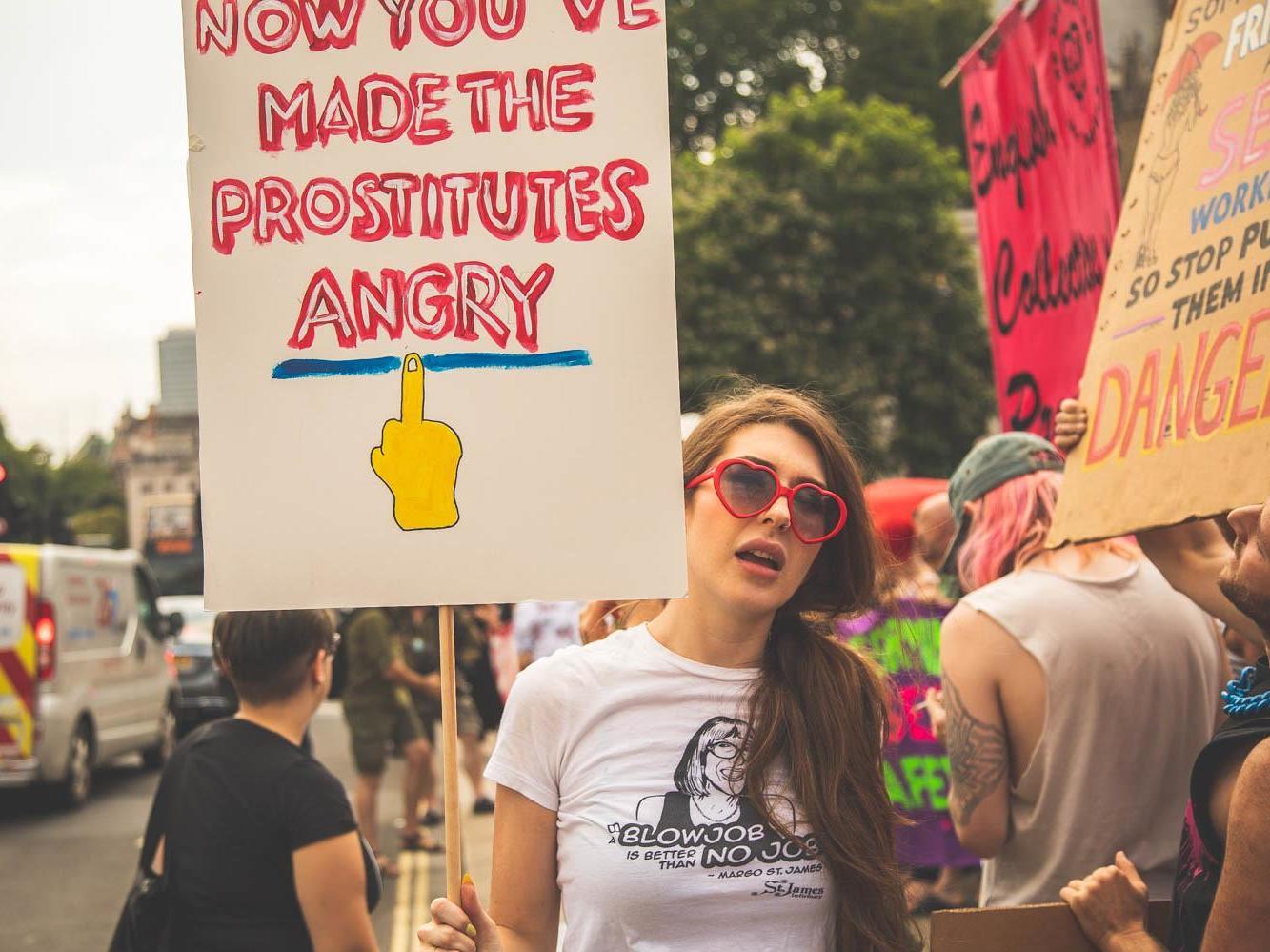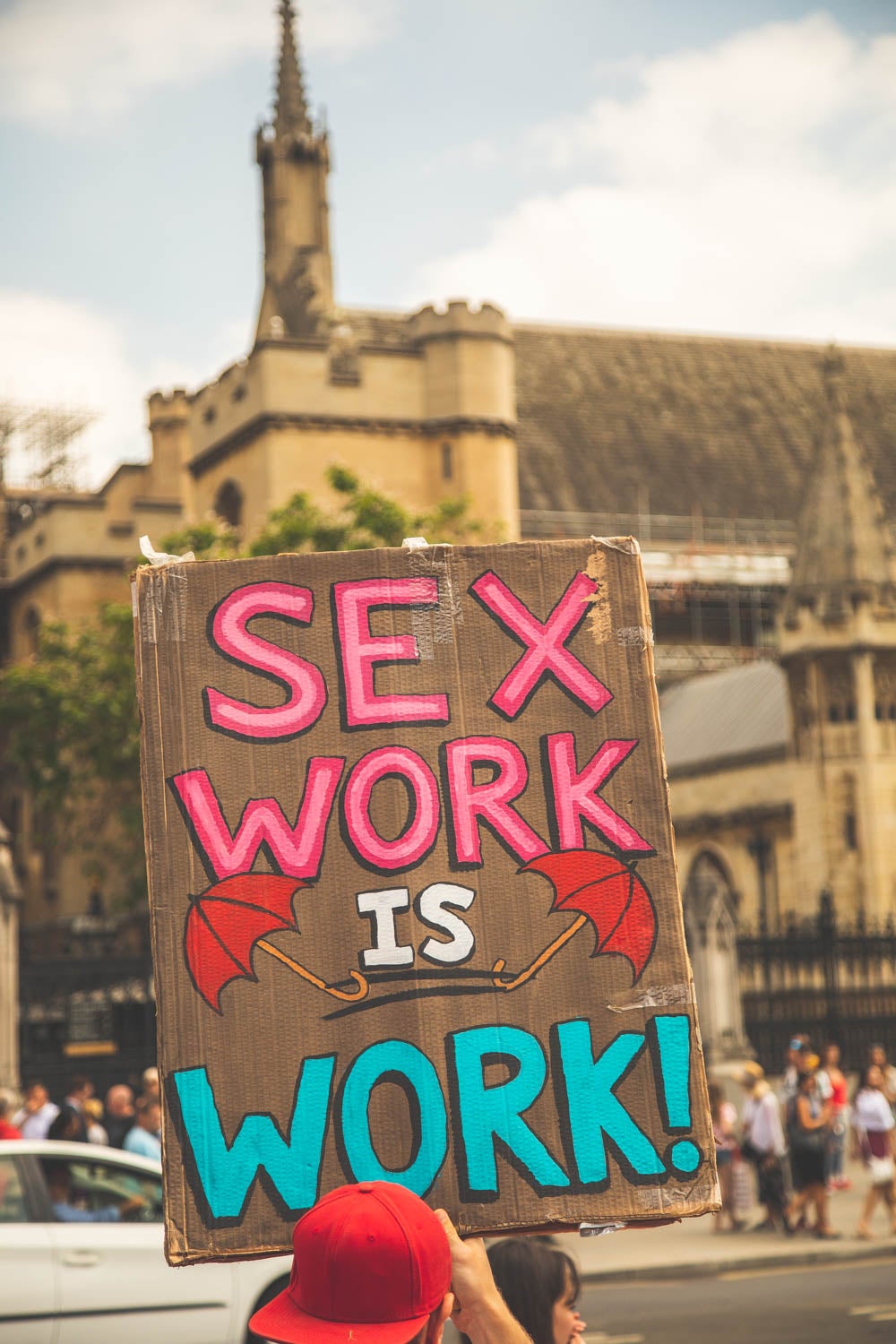International Women’s Day: This is why sex workers are striking in London
This is the third year that sex workers will be marching on International Women's Day. Sophie Gallagher speaks to them about what they want to achieve by walking the capital's streets


Your support helps us to tell the story
From reproductive rights to climate change to Big Tech, The Independent is on the ground when the story is developing. Whether it's investigating the financials of Elon Musk's pro-Trump PAC or producing our latest documentary, 'The A Word', which shines a light on the American women fighting for reproductive rights, we know how important it is to parse out the facts from the messaging.
At such a critical moment in US history, we need reporters on the ground. Your donation allows us to keep sending journalists to speak to both sides of the story.
The Independent is trusted by Americans across the entire political spectrum. And unlike many other quality news outlets, we choose not to lock Americans out of our reporting and analysis with paywalls. We believe quality journalism should be available to everyone, paid for by those who can afford it.
Your support makes all the difference.On a Sunday afternoon Juno Mac would normally be trying to get work. The 30-year-old, who has worked in the sex industry for ten years as an escort, a stripper and a brothel worker says she has to make herself available “around the clock” in order to secure enough work to pay her bills and ensure she has a stable income. But on 8 March, Mac is going on strike for 24 hours and will spend her day marching through central London with thousands of other women.
This is the third year that the strippers and sex workers branch of the United Voices of The World (UVW) union have gone on strike and joined the International Women’s Day march, which ends in Soho Square. They are calling for the full decriminalisation of sex workers and recognition of rights like sick pay, pension provision and a guaranteed basic pay.
Although buying and selling sex is legal in England and Wales, most activities associated with the transaction are still illegal; soliciting in a public place, kerb crawling, owning or managing a brothel and pimping are all criminalised. For a first-time offence of street solicitation a woman can be fined up to £500.
“[Sex workers] have to work enough to get the job security that is denied to them by their employers and the state,” explains Mac. “I’ll be marching to highlight the inadequate working conditions faced by sex workers in this country, namely that they are forced to work in illegal and therefore dangerous ways by the law.”
Mac says by downing tools it draws attention to their “struggle as workers”. “The criminalisation of our workplaces and clients destroys access to help and justice when we are targeted for violence. Theres no reason any sex industry job should be allowed to be a place of exploitation just because it’s been that way for a long time.
“By striking we want to make lawmakers understand the damage created when you criminalise the survival strategies of marginalised people – they will be abused by bosses or clients, they might be locked into a cycle of selling sex to pay off unaffordable fines, closed off from other jobs, they could lose their homes or children.”
Cleaning toilets, raising babies and cooking food is often seen as low value work..."
She says that to "add insult to injury” many more women are now being forced to turn to sex work in order to survive the Conservative policy of austerity that followed the 2008 financial crash, which has been blamed for life expectancy stalling for the first time in a century and even reducing for women in some regions. “Austerity has taken away their other options,” she says.
Mac says this is a particularly pertinent feminist issue because it disproportionately affects women, queer people, migrants, people of colour and disabled people. “It’s for this reason that decriminalisation of sex work is an issue that the international Women’s March community should be given it’s attention to,” she says.
Shiri Shalmy, an organiser at the union branch for sex workers and strippers, who will also be marching, tells The Independent that activism, like the strike, is starting to have a positive impact on the ground.

On Friday the union was informed that two employment tribunals, where they had proposed that women in London strip clubs should be legally recognised with worker status, not independent contractors, were successful. “On Sunday we’ll definitely be celebrating this as well as calling for more progress in this area,” she says.
Not only are they calling for legal change, but Mac and Shalmy say, they want a cultural shift in how women’s work is perceived – and not just that of sex workers.
“Sex workers know that the way their work is devalued resembles the disrespect given to other labour traditionally done by women,” says Mac. “Cleaning toilets, raising babies and cooking food is often seen as low value work – or even not real work at all, but society would collapse without this essentially reproductive labour done in the home."
Shalmy says: “We want to recognise all forms of unrecognised work that women do. We are going to stop cooking, stop caring for the children, stop having sex with men for one day and see the impact.”
Recent surveys suggest UK support for the sex worker rights movement is at an all time high: a 2019 poll found 49 per cent of Brits are in favour of decriminalising brothel-keeping (currently punishable by up to seven years in prison) and 44 per cent think sex workers should not face prosecution for street solicitation.
Between 2015 and 2018 there were 186 prosecutions and 174 convictions for brothel-keeping offences according to the study’s analysis of Home Office figures. Some 54 per cent of these prosecutions were against women defendants.
On Sunday the women will join hundreds of others to walk the streets of London calling for change to these laws. Shalmy says the march brings together migrant women, trans women, undocumented women and “all the women the white patriarchy deem to not fit the definition of a ‘good woman” in order to demand their work is valued and paid fairly.
“As a group of people whose presence is often merely tolerated, with poorly concealed distaste, it feels amazing to take up so much space,” says Mac. “And I hope other supporters turn out to march with us [because] someone they know is a sex worker, whether they realise it or not.”
Join our commenting forum
Join thought-provoking conversations, follow other Independent readers and see their replies
Comments